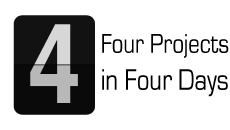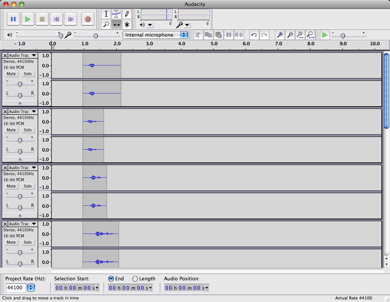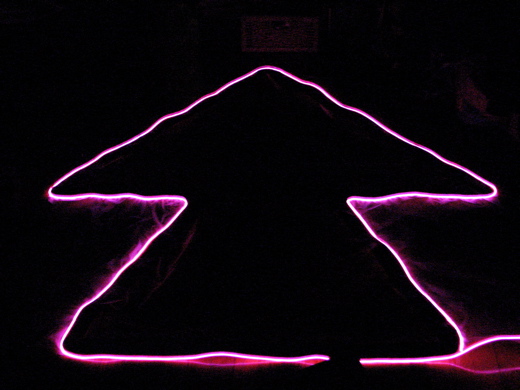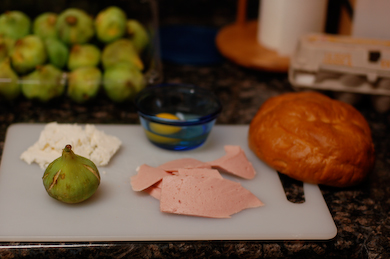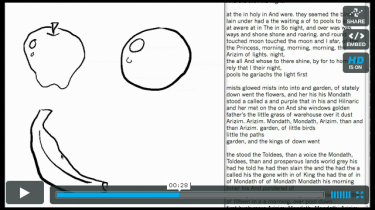Do a creative project every day for four straight days.
Projects must be completed in a day, so they need to be as compact as they are creative
Each project needs a name and documentation posted by the end of the day. Each should be a stand-alone accomplishment
Sundays and Thursdays Pt 1
By zf213 on Day 1, March 2010
Zoe F here, having spent all day working on Sundays and Thursdays! It’s a comic I’ve been doing on and off for a couple years, but this is a little mini 6-page story that’s not part of the main storyline. Today: Penciling finished, inking started. I’d wanted to finish the inking as well, but it will depend on how fast 12:00 comes.
Tools:
Bic pencil 0.5 mm
Pentel Pocket Brush
Faber-Castell Pitt artist pen
Pilot Precise V5 Extra Fine pen

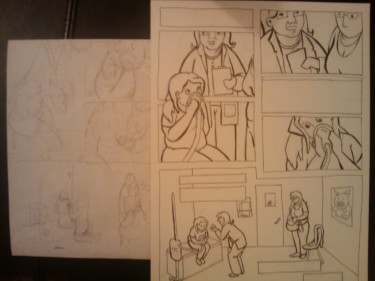
Add comment | March 13th, 2010
playing with cardboard
By Kristin O'Friel on August 2008, Day 4
today i made a flexible surface out of cardboard tubing.
and a recursive tree made out of recycled cardboard – i couldn’t help myself
more 5-in-5 photos on flickr
1 comment | August 1st, 2008
metablog001
By Andrew Schneider on August 2008, Day 5, Guest Star
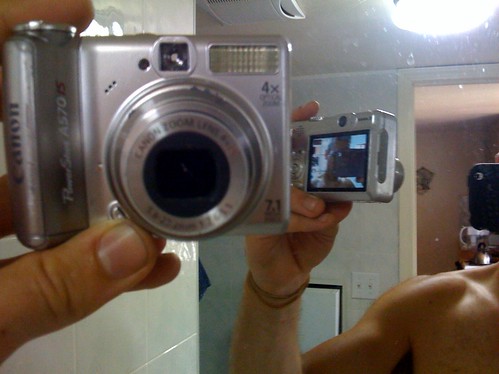 Hey there. My name is Andrew Schneider. I don’t go to ITP right now, but I used to. I was asked by Rob Faludi to be a “guest star” for the “5-in-5″ series currently winding it’s way down at NYU’s Interactive Telecommunications Program. Today is the last day of this particular session. If you don’t know what 5-in-5 is, I have no idea how you got here.
Hey there. My name is Andrew Schneider. I don’t go to ITP right now, but I used to. I was asked by Rob Faludi to be a “guest star” for the “5-in-5″ series currently winding it’s way down at NYU’s Interactive Telecommunications Program. Today is the last day of this particular session. If you don’t know what 5-in-5 is, I have no idea how you got here.
First of all what the fuck is a “guest star”? I hate that heirarchy wierdness.
Second of all, this is my project. I am documenting the documentation of my day doing a project as a participant in 5-in-5 at ITP. I will post things as soon as they are captured. I’ll be doing everything I can to let you know about my progress throughout the day. I’ll be doing tutorials on life, uploading music videos that I make, uploading precious photos of myself, and interacting with my readers. Basically, I’m doing everything that comes to mind. Filtering is low. Release early and often. Make desicions quickly. I don’t know how I feel about that yet, but I’m going to see it through. Here’s the ongoing documentation. I strongly encourage and am asking for commments, questions and participation of all kinds. My phone number is 917-701-3226. Call it. My email is metablog@andrewjs.com. Write it. What happens now.
1 comment | August 1st, 2008
The Dirtiest Word Known to Man Vs. The Happiest Word Known to Man
By Christian Cerrito on August 2008, Day 5
For my last five in five projects, I wanted to do something completely different from anything I had done thus far. As I’ve been focused mainly on making physical things, and finishing the Arrow Flag kept me up half the night, the thought of touching any sort of material or doing any wiring made me cringe a little, it was more then clear that an alternative form of expression was necessary.
Anyone who has ever spent time building anything knows that frustrations can mount quite quickly during the process. If you’ve ever spent anytime in the P-comp lab on the ITP floor, it’s more then likely that you’ve heard people venting these frustrations, often in the form of loud expletives. Swearing, for whatever reasons, is probably one of the most common forms of expression on the planet. Profanity almost always captures the listener’s attention, and nearly always conveys a definite mood or point.
I am no stranger to foul language, and often surprise myself with my mutterings when a task isn’t going as easily as I had originally hoped. Last night, while finishing up my project, I found myself repeating a series of words over and over and over again. At one point, around 4 am, the words seemed to blend into their own incomprehensible sound, forming the ultimate dirty word.
Today, for my last 5-in-5, I decided to keep things pretty simple and recreate a vulgar blended word for all to hear. After spending some time search for a definitive list of ‘swear’ words, I found that the most comprehensive and respected collection seemed to belong to the late George Carlin, from his routine “Seven Dirty Words You Can Never Say on Television.” For those of you not familiar with the routine (and you really should be), Carlin also lists three ‘auxiliary’ words in addition to the original seven, all ten of which are guaranteed to get you in immediate trouble with the FCC. I won’t repeat the words by themselves, but you can find the list on Wikipedia, ihttp://en.wikipedia.org/wiki/7_words, if you are interested). Some of these curses are far too harsh for my usual repertoire, but I decided to include them in this project nonetheless.
Next, I recorded myself saying all of the curses in Audacity, edited them, and then layered the sounds on top of the other. The result is completely incomprehensible, but, by my reckoning, should in fact be the dirtiest word known to man.
Take a listen, and don’t worry, it’s impossible to make out individual profanities: The Dirtiest Word
As a counterpoint, I also poked around the net for the ten happiest words in the English language. There were no definitive sources on this, but I did come across several message board/blog postings, and self help pages, listing ‘happy’ words, so I used a medley of the ones that came up the most frequently.
The words were:
Happy
Bliss
Joy
Ecstasy
Sunshine
Blessed
Love
Laugh
Serene
Smile.
This, by all means, should then be one of the happiest sounds you’ll ever hear;
Take a listen; The Happiest Word
Anyway, I have to say that I was shocked by how similarly the audio collages sound. I expected that the ‘dirtiest word’ would have much harsher ‘R’ and ‘U’ sounds, but instead has a sort of ‘shhhhhhh’ sound. The happiest word just sounds like a bit of a mess, really no surprise given the tonal variation amongst the samples used.
This project, though finished for today, feels like something that would be fun to explore much further.
In the mean time, feel free to drop as many D bombs as you’d like,
And I wish you a “???” day.
Thanks!
5 comments | August 1st, 2008
The Big-Ass Arrow EL Flag
By Christian Cerrito on August 2008, Day 4
One of the biggest problems at the Burning Man Festival is locating all of your friends once you arrive. Cell phones are useless in such a remote location, email is useless (there are a few stations, but the lines are ridiculous), and GPS nearly pointless (Black Rock City moves every year, so it’s nearly impossible to know it’s precise coordinates). One of the most effective means of communicating with those not in your immediate vicinity on the Playa is leaving a message on a huge communal board, a system that quickly degrades into near chaos.
If one is lucky, you may serendipitously chance upon a familiar face amidst the throngs – a truly amazing occurrence considering the forty thousand plus attendees. If you’re not willing to leave your meeting up to fate, however, the best thing that one can do is to inform their friends as to the general location of their camp before arriving. Black Rock City is well planned, with named streets and an actual city grid, Despite this, navigating your way around a temporary tent city metropolis can be a bit chaotic.
1 comment | August 1st, 2008
iWander
By David Steele Overholt on August 2008, Day 4
When studying the Dadaists in undergrad, I remember being fascinated with the artists’ technique of going on walks to gain inspiration and materials for their work. Specifically, Kurt Schwitters’ Merz assemblage pieces (check the bottom of this post for more info). This seems fairly natural and obvious to me now – when I need to get inspiration and think about my projects it’s second nature to go driving, walk, get on the subway, or just take a shower to have time to think and mull-through some ideas, but at the time I was flabbergasted. Why would I want to just walk around for no reason?
The purpose of this project is to go on a randomly navigated journey which concludes in a collage/assemblage, and use the event as an alpha prototype for the creation of an iPhone application that would navigate these journeys for me.
Add comment | August 1st, 2008
The peacemaker: a modified Salazar
By John Dimatos on August 2008, Day 4
it’s food day here in sunny Burbank California for 5-in-5, with a modified Salazar: the peacemaker. A Salazar is a historically fantastic, gorgeous, and satisfying sandwich. It was created 2 years ago at mawopi HQ with Mehmet and Charles, in a desperate moment of severe hunger as a testament to collaborative cooking and fortifying friendship.
A Salazar consists of a a huge turkish bun with some sour cherry spread, a fried egg lying on top of moist roast beef, and armenian string cheese. Delicious, hits all the major food groups, and includes enough tartness to get ya going real good.
Our project today was not a Salazar. This is definitely not the Salazar. I mean, there’s no roast beef. This is a modified Salazar. See, the way it works is that any sandwich that isn’t a Salazar but is made in the original spirit and with some of the original ingredients, is a modified Salazar. Some are good, some are not. Failures are generally named after shamed latin american dictators, such as the Pinochet, a rather disgusting sandwich with turkish kefte and pita bread. This is the peacemaker, a sandwich created to resolve conflict. Don’t believe me? try a fresh august fig with a piece of feta cheese. If you have any fight, argument, or pride left in you afterward I’ll be surprised.
2 comments | August 1st, 2008
Walk
By Tim Szetela on August 2008, Day 4
For the Thursday project, I wanted to map the walk from my apartment to school. Yesterday I had mapped the floor at school with ground textures; with today’s project, I wanted to continue to try other approaches to mapping. So this morning, I recorded the audio of my entire trip to school and took about 100 photographs along the way. Using Flash I created two side by side interfaces to experience and examine this media. A photo still of the interface is below. A link to the Flash file is also below (it may take a little time to load). Mouse over the small photos to navigate the images. And click on the circles if you want to advance the audio. The square represents me moving in real time.
http://itp.nyu.edu/~tas353/walk.jpg
2 comments | August 1st, 2008
Robot Chef Show
By Vikram Tank on August 2008, Day 4
Today Anderson Miller and I took on the task of creating a cooking show based on recipes created by Robot Chef. Robot Chef is a program that Andy wrote in our Programming A to Z class which read all the recipes from three recipe web sites. The program then computes the probablity of ingedients to appear together in recipes. For example it will look at all the recipes and then see how many times for avocados and limes appear together, and then calculate a percentage based on the total number of times that avocados appear that limes appear with them. Robot Chef uses this data to generate recipes. Sometimes the recipes are absolutley disgusting sounding…venison and sugar anyone? Sometimes the results are suprisingly good. On the final day of A to Z Andy brought in some Tequila cake and it was actually pretty great.
For today’s project we made a cooking show with one of the Robot Chef recipes which we called Cashew Suprise Cake. Enjoy.
Robot Chef Cooking Show from Anderson Miller on Vimeo.
1 comment | August 1st, 2008
The Chirpie
By Corey Menscher on August 2008, Day 4

You’ve heard of the Throwie. Well, today I attempted to create the Chirpie! The Chirpie is an audio throwie…a small electronic device that emits a continuous series of chirps and can be attached to metallic surfaces via a magnet. Multiple throwies could be thrown and attached to a surface to provide a cacophony of chirps! I have no idea if Chirpies have been made before, but I decided to attempt it to learn something about tone generation with analog circuits.
(more…)
1 comment | August 1st, 2008
Robot Chef – Cooking Show
By C. Anderson Miller on August 2008, Day 4
Today Vikram Tank and I worked together to produce a cooking show based on my Spring project, Robot Chef (http://www.robotchef.tv).
2 comments | August 1st, 2008
Strokeweight: Drawing Text
By Adam Parrish on August 2008, Day 4
Today I made a New Interface for Textual Expression, as part of a continuation of my master’s thesis research. Strokeweight is an interface that correlates gestures of drawing to gestures of text. Click below to view a demonstration video on Vimeo. Technical details can be found after the jump.
(The source text used in the demonstration video is Lord Dunsany’s Poltarnees, Beholder of Ocean, which has nothing to do with fruit. I don’t know why I drew fruit. I guess I drew fruit because it’s easy to draw, and also delicious.)
Add comment | August 1st, 2008
Education for the Undead?
By Robert C. Moon on August 2008, Day 4
For Day 4′s project, Christian Bovine and I wanted to shoot a short video within 24 hours. A friend of mine in San Fransisco recently finished a 48 hour Film Festival, where contestants were given requirements such as character name or prop right before starting the 48 hour film production. Apple has a similar competition but 24 hours so it is definitely possible to complete. We decided that we wanted to attempt a similar constraint and created a web application that allowed ITP students to fill out possible requirements of a character’s name, prop and line of dialogue. We randomly chose: Mimmi Vanilla, cow and “Your chile is long.” We both agreed to wake up early to discuss possible concepts but instead I mentioned to Christian that “I feel like a zombie,” thus the birth of our new concept and tossing out the requirements all together. We developed the idea for Zombies attending ITP and asked the faculty and students to participate. Here is our video that we finished within a day. Enjoy.
Add comment | August 1st, 2008
Soft Circuit Sampler
By Kate Hartman on August 2008, Day 3, Guest Star
For my project for the day, I created the beginnings of a Soft Circuit Sampler – a conductive textiles version of the traditional needlework sampler. According to Wikipedia:
“The oldest surviving samplers were constructed in the 15th and 16th centuries. As there were no pre-printed patterns available for needleworkers, a stitched model was needed. Whenever a needlewoman saw a new and interesting example of a stitching pattern, she would quickly sew a small sample of it onto a piece of cloth – her ‘sampler’. The patterns were sewn randomly onto the fabric as a reference for future use, and the woman would collect extra stitches and patterns throughout her lifetime.
16th Century English samplers were stitched on a narrow band of fabric 6-9in (15-23cm) wide. As fabric was very expensive, these samplers were totally covered with stitches. These were known as band samplers and valued highly, often being mentioned in wills and passed down through the generations.”

I decided to do an interpretation of the band sampler and have the base cloth for my sampler be a long, narrow form:

Add comment | August 1st, 2008
Out2Sea
By Armanda Lewis on August 2008, Day 4
Today was another work day, so I decided to do a short animation with AfterEffects. Since I have practically no experience with the program, I wanted to see if I could animate one of my favorite pictures ever. Here is my inspiration for Day #4 of 5-in-5:http://itp.nyu.edu/blogs/al861/files/lakepic1.thumbnail.jpg
I took this picture when some of my friends and I were coming back from a weekend on Amantani Island on Lake Titicaca (in Peru), and it was breathtaking. I wanted to see if I could deconstruct this picture in AfterEffects and make the water, clouds, and sunlight move, so here is the finished result. The resolution is relatively low because I wanted to minimize render time and disk space.
1 comment | August 1st, 2008
